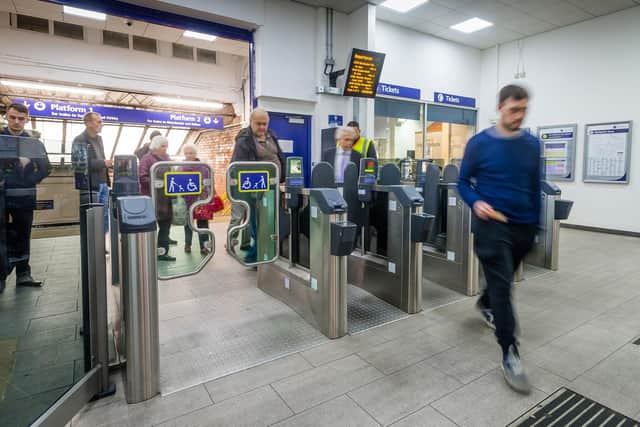The rail ticket ‘polygraph': Northern deploys new kit to detect ‘chancers’ using the wrong ticket at station barriers
and live on Freeview channel 276
Automated ticket checks at barriers in Northern-managed stations are about to get ‘smarter’ thanks to new technology that will alert staff to potential ‘chancers’ using an incorrect ticket.
What are polygraphs?
Polygraphs are commonly referred to as lie detector tests; they measure physiological indicators such as blood pressure, pulse, respiration, and skin conductivity while a person is asked a series of questions, with the belief being that a liar can be caught out by their physiological responses.


Does that mean lie detectors are coming to Lancashire stations?
Advertisement
Hide AdAdvertisement
Hide AdAlthough Northern has referred to the new technology as ‘rail ticket polygraphs’, it does not mean customers are set to face lie detectors on arrival! Instead, the comparison refers to how it will uncover a false ticket like how a polygraph uncovers a false truth.
The new technology will quickly and accurately check that a ticket is valid, and alert staff if that validity requires additional checks such as presentation of the appropriate railcard. Staff will then confirm the ticket is being used correctly, taking the necessary action if it is not.
Why is this technology needed?
With over 300,000 people using automated barriers across its network every day, Northern says checking the credentials of every ticket is a huge task - particularly at the larger stations during rush hour.
In a trial at Manchester Victoria earlier this month, the technology was used during a revenue protection exercise where it helped detect 180 people in one day alone, and almost 900 during the full length of the trial.
Advertisement
Hide AdAdvertisement
Hide AdThose attempting to travel using a ticket they were not eligible to use included 52 people benefitting from a railcard discount they were not able to present for inspection and 24 adults travelling on a children’s ticket.
As a result, the train operator was able to issue 79 penalty fares worth over £1,500 and launch 101 investigations into various ticket irregularities - the process by which Northern recovers money for the taxpayer lost by fraudulent travel.
What do the people behind the technology say?
Mark Powles, customer and commercial director at Northern, said: “This technology will be invaluable for our gate line and revenue protection colleagues whose job it is to ensure ticket checks are carried out quickly and efficiently.
“Unfortunately, we know that a small minority of customers try to exploit the automated nature of barrier checks to travel on tickets they know they’re not eligible to use.
Advertisement
Hide AdAdvertisement
Hide Ad“The kit is very easy to install and can be deployed to known hotspots across the whole network to help tackle this fraudulent activity.”
Northern worked with The Ticket Keeper (TTK), an organisation that specialises in the development, marketing and roll-out of ticketing systems for the UK rail industry, on the new technology.
Tim Handel, managing director of TTK, said: "TTK’s collaboration with Northern draws on our years of expertise at the forefront of rail ticket validation enabling us to bring innovative and cost-effective solutions to the industry.
“Our motivation is to enable Northern to identify and prevent fraudulent rail travel and we are pleased to continue our work with them to further develop the TTK ‘T-Val’ technology and build on the already considerable success born out of this partnership.”
